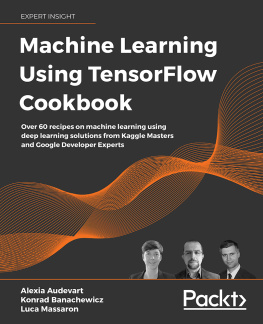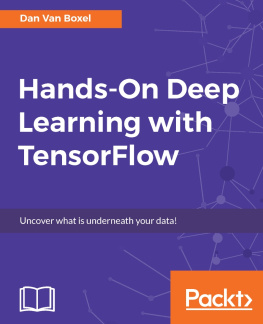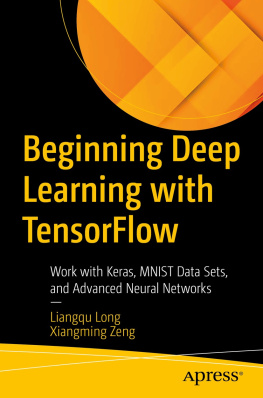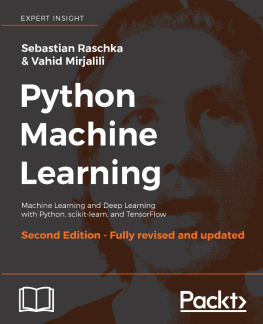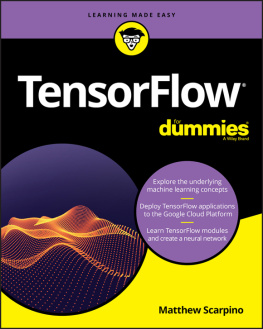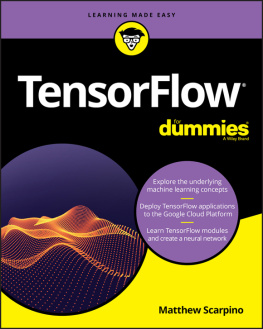Alexia Audevart - Machine Learning Using TensorFlow Cookbook: Over 60 recipes on machine learning using deep learning solutions from Kaggle Masters and Google Developer Experts
Here you can read online Alexia Audevart - Machine Learning Using TensorFlow Cookbook: Over 60 recipes on machine learning using deep learning solutions from Kaggle Masters and Google Developer Experts full text of the book (entire story) in english for free. Download pdf and epub, get meaning, cover and reviews about this ebook. year: 2021, publisher: Packt Publishing, genre: Home and family. Description of the work, (preface) as well as reviews are available. Best literature library LitArk.com created for fans of good reading and offers a wide selection of genres:
Romance novel
Science fiction
Adventure
Detective
Science
History
Home and family
Prose
Art
Politics
Computer
Non-fiction
Religion
Business
Children
Humor
Choose a favorite category and find really read worthwhile books. Enjoy immersion in the world of imagination, feel the emotions of the characters or learn something new for yourself, make an fascinating discovery.
- Book:Machine Learning Using TensorFlow Cookbook: Over 60 recipes on machine learning using deep learning solutions from Kaggle Masters and Google Developer Experts
- Author:
- Publisher:Packt Publishing
- Genre:
- Year:2021
- Rating:3 / 5
- Favourites:Add to favourites
- Your mark:
Machine Learning Using TensorFlow Cookbook: Over 60 recipes on machine learning using deep learning solutions from Kaggle Masters and Google Developer Experts: summary, description and annotation
We offer to read an annotation, description, summary or preface (depends on what the author of the book "Machine Learning Using TensorFlow Cookbook: Over 60 recipes on machine learning using deep learning solutions from Kaggle Masters and Google Developer Experts" wrote himself). If you haven't found the necessary information about the book — write in the comments, we will try to find it.
Master TensorFlow to create powerful machine learning algorithms, with valuable insights on Keras, Boosted Trees, Tabular Data, Transformers, Reinforcement Learning and more
Key Features- Work with the latest code and examples for TensorFlow 2
- Get to grips with the fundamentals including variables, matrices, and data sources
- Learn advanced deep learning techniques to make your algorithms faster and more accurate
The independent recipes in the Machine Learning Using TensorFlow Cookbook will teach you how to perform complex data computations and gain valuable insights into your data. You will work through recipes on training models, model evaluation, sentiment analysis, regression analysis, artificial neural networks, and deep learning each using Googles machine learning library, TensorFlow.
This cookbook begins by introducing you to the fundamentals of the TensorFlow library, including variables, matrices, and various data sources. Youll then take a deep dive into some real-world implementations of Keras and TensorFlow and learn how to use estimators to train linear models and boosted trees, both for classification and for regression to provide a baseline for tabular data problems.
As you progress, youll explore the practical applications of a variety of deep learning architectures, such as recurrent neural networks and Transformers, and see how they can be applied to computer vision and natural language processing (NLP) problems. Once you are familiar with the TensorFlow ecosystem, the final chapter will teach you how to take a project to production.
By the end of this machine learning book, you will be proficient in using TensorFlow 2. Youll also understand deep learning from the fundamentals and be able to implement machine learning algorithms in real-world scenarios.
What you will learn- Grasp Linear Regression techniques with TensorFlow
- Use Estimators to train linear models and boosted trees for classification or regression
- Execute neural networks and improve predictions on tabular data
- Master convolutional neural networks and recurrent neural networks through practical recipes
- Apply reinforcement learning algorithms using the TF-agents framework
- Implement and fine-tune Transformer models for various NLP tasks
- Take TensorFlow into production
If you are a data scientist or a machine learning engineer, and you want to skip detailed theoretical explanations in favor of building production-ready machine learning models using TensorFlow, this book is for you.
Basic familiarity with Python, linear algebra, statistics, and machine learning is necessary to make the most out of this book.
Alexia Audevart: author's other books
Who wrote Machine Learning Using TensorFlow Cookbook: Over 60 recipes on machine learning using deep learning solutions from Kaggle Masters and Google Developer Experts? Find out the surname, the name of the author of the book and a list of all author's works by series.

